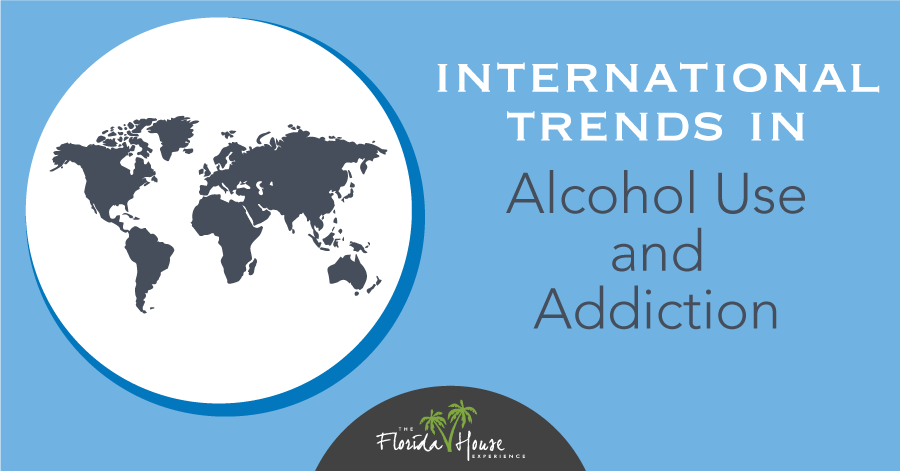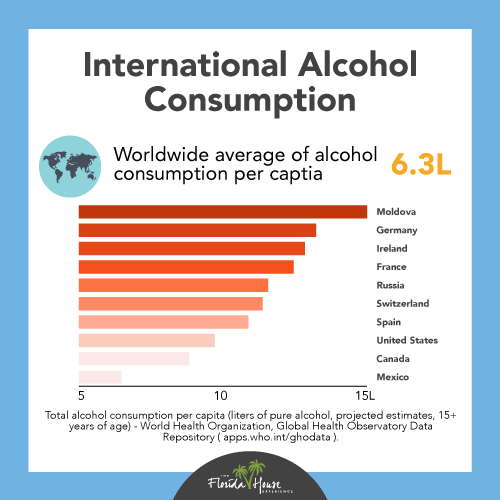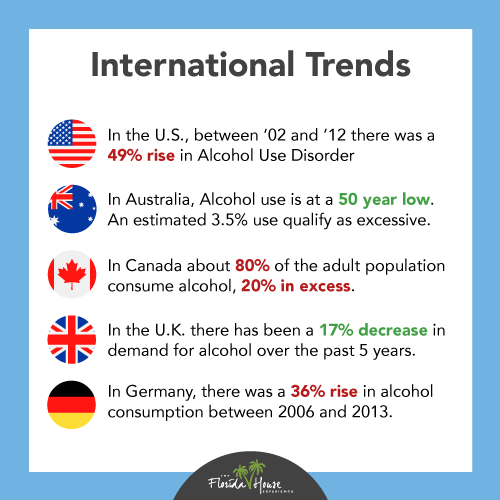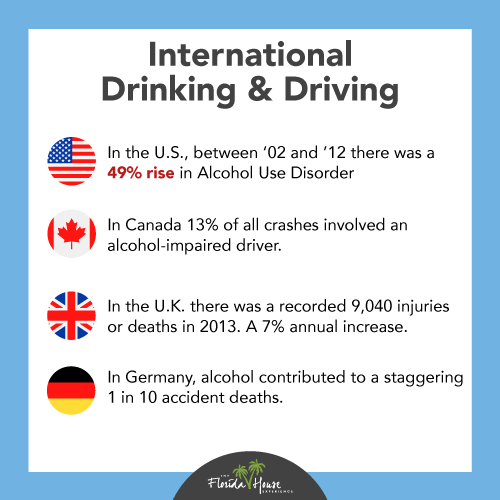
We all know that alcohol use and abuse is a big issue here in the United States where more than 15 million adults are estimated to have an alcohol use disorder. Alcohol addiction and injuries, crimes, disease and deaths due to alcohol are not just an American problem, though; these issues impact people around the world.
The Global Information System on Alcohol and Health (GISAH) is an information assessment and monitoring tool used by the World Health Organization. It estimates that three million people worldwide died as a direct result of “harmful use of alcohol” in 2016. This is despite the fact that in the same year more than half of all adults, 57 percent, completely abstained from alcohol consumption.
To better understand how alcohol abuse in America compares to other countries, we’ve gathered statistics from the United States, Canada, Australia, the United Kingdom and Germany.
Per Capita Alcohol Consumption Rates
 According to estimates by the World Health Organization, the average total per capita consumption rate of pure alcohol worldwide was 6.2 liters in 2016. This estimate factors in the different alcohol content of various alcoholic beverages to create a standardized measurement.
According to estimates by the World Health Organization, the average total per capita consumption rate of pure alcohol worldwide was 6.2 liters in 2016. This estimate factors in the different alcohol content of various alcoholic beverages to create a standardized measurement.
Among our list of five countries, Germany reported the highest per capita alcohol consumption rates at 13.4 liters per year, followed by the United Kingdom at 11.4 liters and Australia at 10.6 liters. In the United States, the rate is 9.8 liters, while Canada had the lowest annual alcohol consumption on our list of five countries with 8.9 liters.
On a global scale, annual consumption of beer, wine and liquor in the United States doesn’t even rank in the top 25. The country with the highest alcohol consumption rates is Belarus, where adults drink an average of 17.5 liters of pure alcohol every year, followed by Moldova at 16.80 liters, Lithuania at 15.40 liters and Russia at 15.10 liters.
Alcohol Use Disorder Rates
 Alcoholism, now commonly referred to as alcohol use disorder or AUD, is prevalent throughout the world. The Global Status Report on Alcohol and Health produced by the World Health Organization estimates that in 2004, “3.8 percent of all global deaths were attributable to alcohol, 6.2 percent for men and 1.1 percent for women.” The WHO also notes that “the harmful use of alcohol is the leading risk factor for death in men aged 15-59.”
Alcoholism, now commonly referred to as alcohol use disorder or AUD, is prevalent throughout the world. The Global Status Report on Alcohol and Health produced by the World Health Organization estimates that in 2004, “3.8 percent of all global deaths were attributable to alcohol, 6.2 percent for men and 1.1 percent for women.” The WHO also notes that “the harmful use of alcohol is the leading risk factor for death in men aged 15-59.”
Here in the United States, alcohol use disorder rose by about 49 percent between 2002 and 2012, and about one out of every eight American adults “now meets the diagnostic criteria for alcohol use disorder” according to the results of the National Epidemiologic Survey on Alcohol and Related Conditions published by the Journal of the American Medicine Association Network.
In Australia, alcohol consumption is currently at its lowest level in 50 years, and as of 2010, an estimated 3.5 percent of the adult population there met the criteria for having an alcohol use disorder. The prevalence of AUD among males was 2.5 times higher than it was for females.
Drinking alcohol is common in Canada, where an estimated 80 percent of the adult population consumes beer, spirits or wine. In terms of alcohol abuse and addiction, close to 20 percent of Canadian drinkers exceed low-risk drinking guidelines developed by government health agencies. Alcohol use disorders make up the bulk of both substance-use related hospitalizations, and alcohol is the most commonly used substance among those seeking treatment for addiction in Canada.
The United Kingdom has seen a drop of 17 percent in the demand for alcohol misuse treatment over the last five years, where over 75,000 people accessed alcohol detox and rehab services in 2017/2018. About 41 percent of those who sought alcohol addiction treatment also required mental health treatment, and their average age was 46.
German health researchers reported a dramatic 36 percent rise in AUD rates between 2006 and 2013, jumping from 1.3 million to 1.6 million. The same number of Germans also reported drinking “a lot.” However, they did not feel they were addicted to alcohol.
Drinking and Driving
 Impaired driving is a major issue in all countries where alcohol consumption is common. Despite efforts to curb drinking and driving through public awareness campaigns, hefty fines and jail time, alcohol-related traffic crashes continue to be a leading cause of death in many countries.
Impaired driving is a major issue in all countries where alcohol consumption is common. Despite efforts to curb drinking and driving through public awareness campaigns, hefty fines and jail time, alcohol-related traffic crashes continue to be a leading cause of death in many countries.
In the United States, the Centers for Disease Control and Prevention reports that alcohol was a confirmed factor in 28 percent of all traffic-related deaths in 2016, and 29 people are killed every day “in motor vehicle crashes that involve an alcohol-impaired driver.” The annual cost of crashes that involve alcohol impairment is estimated to be over $44 billion.
By comparison, in Canada in 2014, 13 percent of all fatal road crashes involved an alcohol-impaired driver, while close to 16 percent of fatal accidents involved one or more drivers who tested positive for both alcohol and drug use.
The United Kingdom recorded 9,040 injuries or deaths caused by an impaired driver in 2016. That number is up 7 percent from the previous year, and alcohol-impaired driving causes an estimated 5 percent of all crash-related casualties.
Like other countries where alcohol is legal, it was a contributing factor in approximately 1 in 10 road accident deaths in Germany in 2015, and a staggering 30 percent of vehicle crash fatalities in Australia.
Are You Struggling With Alcohol Use Disorder?
If alcohol is a problem in your life, getting treatment now can give you the tools you need to get started on your road to recovery.
Here at FHE Health, we use safe, science-based assessment and treatment tools to support you through alcohol detox and rehab. Don’t try to tackle your drinking problem alone. Call us anytime to talk, learn more about our accredited alcohol treatment programs, and find out how we can help you get well.






